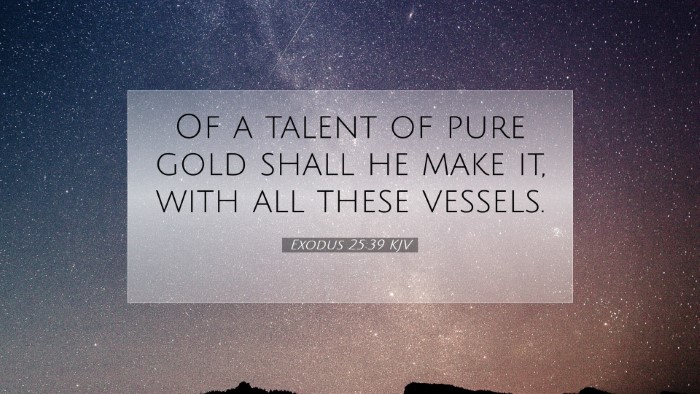Commentary on Exodus 25:39
Exodus 25:39 states, "Of a talent of pure gold shall he make it, with all these vessels." This verse is part of the broader context of God's detailed instructions for the construction of the Tabernacle and its furnishings, which were essential for the Israelites' worship and relationship with God during their desert wanderings.
Contextual Overview
The command to create the Menorah, or the golden lampstand mentioned in Exodus 25, is foundational to understanding the sacred space established in Israelite worship. This passage emphasizes the importance of quality and purity in offerings made to God. The specifications given highlight God's desire for beauty and excellence in what is dedicated to Him.
Insights from Matthew Henry
Matthew Henry notes that the materials used in the construction of the Tabernacle were not merely for practicality but served to reflect God's glory and majesty. He remarks on the significance of using pure gold, indicating that such materials are symbols of the divine presence and holiness. For Henry, the elaborate details serve not only as a guide for craftsmanship but also as a reminder of the kingly nature of God, commanding the best from His people.
Insights from Albert Barnes
Albert Barnes expands on the significance of the specific weight given, suggesting that the exactness emphasizes God's order and precision in matters of worship. In his view, the "talent of pure gold" symbolizes the worthiness of God and implies that our offerings should reflect our understanding of His greatness. Barnes encourages believers to contemplate their own offerings to God, understanding them as expressions of worship that should be done with the utmost care and devotion.
Insights from Adam Clarke
Adam Clarke emphasizes the importance of the symbolism involved in the construction of sacred items. He argues that the Menorah, being crafted of pure gold, is not only functional but also carries spiritual significance. Clarke points out that the number of branches and their arrangement represent various aspects of God’s provision and light to His people. His commentary implores readers to recognize the richness of symbolism present in the Tabernacle's furnishings, encouraging a deeper spiritual connection through understanding these elements.
Theological Implications
The command to use a talent of pure gold introduces several theological themes. Firstly, it highlights God's demand for holiness in worship. The quality of materials reflects the reverence due to God, reminding believers that worship must come from a place of sincerity and the best we can offer.
Secondly, it suggests that God's presence is to be sought after in a beautiful and reverent manner. In a contemporary context, this raises questions about how Christians approach worship, their gatherings, and the resources they dedicate to God.
Practical Applications
For Pastors: This verse serves as an inspiration to lead congregations in offering worship that is both genuine and excellent. It challenges pastors to cultivate an environment where believers are encouraged to bring their best to the altar, be it in ministry, resources, or their spiritual lives.
For Students and Theologians: The intricate specifications of the Tabernacle challenge scholars to investigate the interplay between the physical and spiritual realms in worship. The understanding of such details deepens the appreciation of how God’s instructions reflect His nature and aspirations for His people.
For Bible Scholars: This verse opens avenues for inquiry into the craftsmanship of the ancient Israelites, exploring how material culture can influence spiritual expression. Scholars are encouraged to dive into archaeological studies that may complement biblical texts, providing a fuller picture of its historical context.
Conclusion
Exodus 25:39 is a verse rich in meaning and application. It not only sets the stage for the ensuing actions taken by the Israelites in worship but also serves as a timeless reminder of God's desire for purity and excellence. As believers reflect on their own acts of worship today, this passage prompts a renewed dedication to offering God their very best, drawn from the lessons of the ancient Tabernacle.


